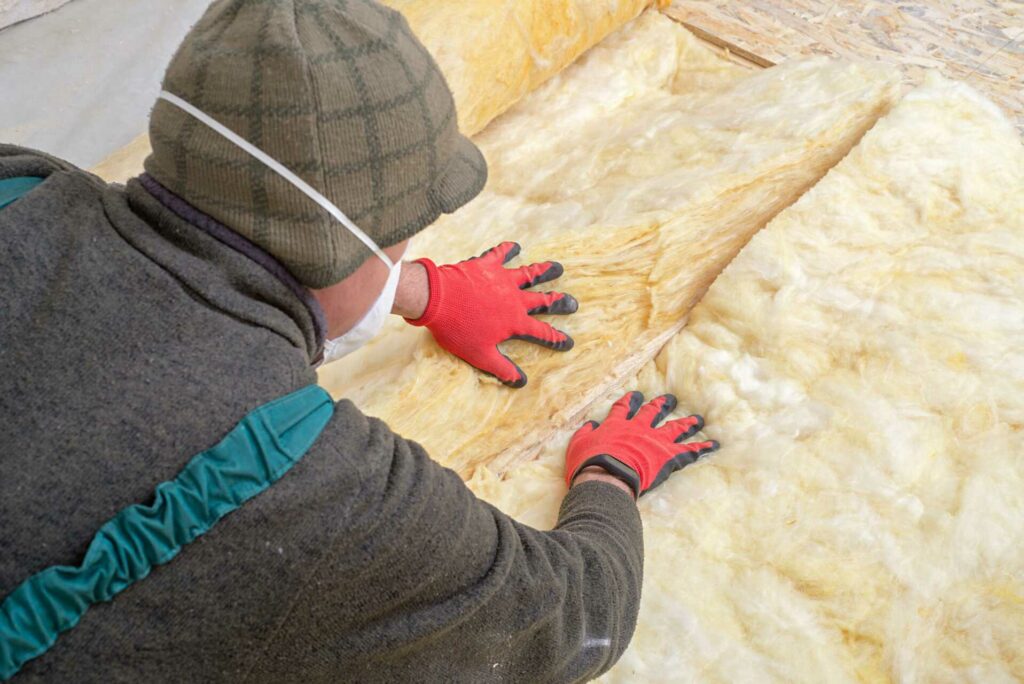
Contents
You may not be aware that environmentally friendly attic insulation products regulate temperature and contribute to a healthier environment. The cutting-edge materials used in these products offer an eco-conscious solution for your home, but how do they compare in performance and cost-effectiveness? Discover the top-rated eco-friendly attic insulation options that are planet-friendly and provide long-term benefits for your household.
Key Takeaways
- Recycled Denim Insulation offers an eco-friendly solution with excellent thermal performance.
- Cork Attic Insulation is renewable, durable, and provides exceptional temperature regulation.
- Wool Insulation for Attics is sustainable, biodegradable, and highly efficient in energy savings.
- Cellulose Insulation is made from recycled paper, reducing waste and enhancing energy efficiency.
- Soy-Based Attic Insulation is non-toxic, renewable, and contributes to a greener future.
Benefits of Eco-Friendly Attic Insulation
When considering attic insulation, opting for environmentally friendly products can bring numerous benefits to both your home and the environment. Environmentally friendly attic insulation offers significant energy savings by reducing heat loss during the winter and heat gain during the summer, leading to lower utility bills and increased comfort in your living space. By minimizing the need for excessive heating and cooling, these products contribute to a reduced environmental impact by lowering carbon emissions.
In addition to energy savings and environmental impact, environmentally friendly attic insulation also provides cost efficiency. While the initial investment may be slightly higher than traditional insulation materials, the long-term savings on energy bills make it a financially wise choice.
Furthermore, environmentally friendly insulation materials are often more durable and require less maintenance, further saving you money in the long run.
Additionally, choosing environmentally friendly attic insulation can have health benefits for you and your family. Conventional insulation materials may contain harmful chemicals or allergens that can affect indoor air quality and exacerbate respiratory issues. Environmentally friendly options, on the other hand, are made from natural or recycled materials that are non-toxic and pose minimal health risks, creating a safer and healthier indoor environment for all occupants.
Recycled Denim Insulation Overview
Occasionally, denim insulation is an eco-conscious and creative choice for insulating your attic. Made from recycled denim, this type of insulation offers an eco-friendly alternative to traditional materials. Recycled denim insulation is an excellent option for those looking to reduce their carbon footprint and contribute to a more environmentally conscious home.
Recycled denim insulation isn’t just environmentally friendly but also offers excellent thermal performance. It effectively regulates the temperature in your attic, keeping it cool in the summer and warm in the winter. This can lead to energy savings and increased comfort within your living space.
One of the key advantages of recycled denim insulation is its non-toxic nature. Unlike some conventional insulation materials, recycled denim doesn’t contain harmful chemicals or irritants, making it a safe choice for you and your family. Additionally, its sound absorption capabilities can help reduce noise levels in your home, providing a peaceful environment.
Cork Attic Insulation Solution
Cork attic insulation is an eco-friendly choice that offers excellent thermal and acoustic properties. Its natural properties make it resistant to mold, mildew, and pests, ensuring a healthier indoor environment for your home. The installation process is straightforward, typically involving cutting the cork sheets to fit the attic space and securing them in place for long-lasting insulation benefits.
Cork Benefits
Consider the many advantages of utilizing cork as an insulation material in your attic. Cork, known for its sustainability and excellent thermal properties, offers several benefits for eco-conscious homeowners:
Renewable Resource: Cork is harvested from the bark of cork oak trees, which can regenerate and be harvested again every 9-12 years without harming the tree.
Thermal Insulation: Cork’s cellular structure traps air, providing effective thermal insulation that helps regulate indoor temperature and reduce energy consumption.
Sound Absorption: Cork’s natural properties make it an excellent sound insulator, reducing noise transfer between floors and rooms.
Hypoallergenic: Cork is resistant to mold, mildew, and pests, making it a healthier choice for those with allergies or respiratory sensitivities.
Installation Process
When insulating your attic with cork, the installation process plays a significant role in maximizing the benefits of this eco-friendly material. You have two main options for installing cork attic insulation: DIY installation or professional installation.
Many homeowners opt for the DIY route for cost savings and a sense of accomplishment. DIY installation kits are available, making them accessible for those with basic handyman skills. By taking on the installation yourself, you save on labor costs and contribute to your home’s sustainability.
On the other hand, professional installation ensures that the cork insulation is skillfully placed for maximum energy efficiency. Professional installers have the experience and tools to ensure a precise and effective insulation job, potentially leading to long-term savings on your energy bills.
Whether you choose DIY installation for a hands-on approach or prefer the expertise of professionals for the best results, the installation process is vital in harnessing the full potential of cork attic insulation.
Wool Insulation for Attics
With a growing emphasis on eco-friendly living practices, wool insulation has emerged as a popular choice for attics. Made from a environmentally-friendly material and offering high performance, wool insulation provides several benefits for your home.
Benefits of Wool Insulation for Attics:
Natural and Environmentally-Friendly: Wool insulation is derived from sheep’s wool, a renewable and biodegradable resource. By choosing wool insulation, you contribute to a more environmentally-friendly environment.
Thermal Performance: Wool insulation boasts excellent thermal properties, effectively trapping heat in winter and keeping your attic cool in summer. This high performance helps reduce energy consumption for heating and cooling.
Moisture Regulation: Wool insulation can absorb and release moisture from the air, helping to regulate humidity levels in your attic. This feature prevents mold and mildew growth, ensuring a healthier living environment.
Fire Resistance: Wool is naturally fire-resistant, providing an added layer of safety in your home. In the event of a fire, wool insulation won’t readily ignite, potentially slowing down the spread of flames.
Cellulose Insulation Benefits
Cellulose insulation, derived from recycled paper materials treated with fire-retardant chemicals, offers multiple benefits for attics seeking energy efficiency and long-lasting viability.
When it comes to energy efficiency, cellulose insulation stands out for its high R-value, which measures the material’s resistance to heat flow. This means that cellulose insulation can effectively reduce the amount of heat that escapes your attic during cold months and keeps it cool in the summer, lowering your energy bills year-round.
Moreover, cellulose insulation is an eco-friendly material, making it an environmentally conscious choice for your attic. By using recycled paper materials, cellulose insulation helps reduce waste and promotes the reuse of resources. This environmentally friendly option also minimizes the carbon footprint associated with insulation production, aligning with the principles of longevity and responsible consumption.
In addition to its energy efficiency and long-lasting viability benefits, cellulose insulation offers excellent soundproofing qualities, reducing noise transmission between different areas of your home. This added feature can contribute to creating a more comfortable and peaceful indoor environment.
Soy-Based Attic Insulation Options
Utilizing soy-derived materials for attic insulation presents an environmentally conscious and eco-friendly option for homeowners aiming to enhance energy efficiency while prioritizing environmental stewardship. Soy insulation offers an eco-conscious alternative to traditional insulation materials, benefiting both your home and the planet. Here are some key points to bear in mind when exploring soy-derived attic insulation options:
Soy Derived Alternatives: Soy insulation is made from renewable soybean oil, reducing the dependence on fossil fuels and lowering carbon emissions. By opting for soy-derived alternatives, you’re contributing to a more environmentally friendly future and supporting sustainable practices.
Environmental Impact: Soy insulation has a reduced environmental impact compared to conventional insulation materials. It’s biodegradable, non-harmful, and energy-efficient, making it a safe and environmentally sound choice for your attic insulation needs.
Cost Comparison: While soy-derived insulation may have a slightly higher initial cost than traditional options, the long-term benefits in energy savings and environmental impact outweigh the upfront investment. Take into account the overall cost-effectiveness and environmentally friendly advantages when making your decision.
Durability and Performance: Soy insulation is renowned for its resilience and exceptional performance in regulating temperature and soundproofing. Investing in soy-derived attic insulation can offer long-lasting benefits for your home while reducing your carbon footprint.
Make an environmentally friendly choice for your attic insulation with soy-derived alternatives that prioritize environmental stewardship and energy efficiency.
Wrap-Up
Why settle for traditional insulation when you can opt for top-rated eco-friendly options that save you money and benefit the environment? With recycled denim, cork, wool, cellulose, and soy-based insulation products, you can enhance energy efficiency, decrease carbon emissions, and support sustainability in your home. Make the smart choice for your attic insulation and make a positive impact on the planet. Choose eco-friendly insulation for a greener future.
Recent Posts
Top Attic Air Sealing Techniques for Insulation
Have you ever considered how much energy might be wasted through unnoticed gaps in your
Top 10 Attic Air Sealing Techniques for Insulation
Just as a tightly sealed ship avoids leaks and remains buoyant, your attic’s air sealing
What Are the Best Attic Air Sealing Techniques?
When it comes to attic air sealing, understanding the common leakage points is vital for

